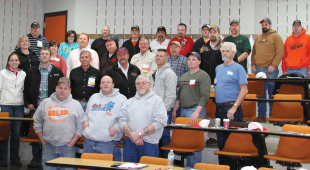
Instead, faster-paced lives today demand meals that are much more quickly prepared.
Rapid change is occurring throughout Iowa’s growing food industry, experts say. Iowa companies are aggressively chasing new and better products, even as they labor to prepare for tough and complicated new federal safety rules. CIRAS is attempting to help with all of those concerns.
CIRAS for years has worked through the U.S. government’s Manufacturing Extension Partnership to help firms find assistance via the Iowa State University Meat Laboratory, the university’s Center for Crops Utilization Research (CCUR), and other affiliates. Last year, 70 Iowa food manufacturers who have worked with CIRAS reported a combined $62 million in economic impact from a total of 132 different projects.
Federal government statistics show “processed food” was the second-largest manufacturing sector in Iowa in 2012, accounting for more than $3.1 billion of the state’s $13.9 billion in exports.
“I think CIRAS and Iowa State as a whole are critical for businesses today in regard to how quickly the regulatory environment is changing,” said Tim O’Tool, vice president of operations for C&S Products Company in Fort Dodge. “Businesses today need to be able to develop those types of partnerships to be able to move through those changes.”

Through CIRAS, Cordray and other Iowa State experts have worked for years to help both large and small food companies develop new products, protect food safety, and plan appropriately for growth. CIRAS experts regularly address ISU Extension and Outreach classes on meat preparation, offering expertise on topics such as business continuity planning, innovation processes, and Internet marketing strategies.
“What we’re trying to get the meat industry to do is be more aware of CIRAS as part of some of the things we do,” Cordray said. “It takes more than just being able to produce a good sausage to stay in business.”
The meat business is good, Cordray believes. He credits cultural change during the past few decades for building strong consumer demand for items such as preseasoned steak and pork loins that can cook in minutes in a selfventing package.
“The more value we can add to something before it leaves the state, the better off we are,” he said. “We’re a whole lot better sending out packages of processed meats, packages of sausages, and packages of ham and distributing them around the country than if we are sending out tractor-trailer loads of raw meat.”
Other Iowa firms are following different paths to value-added agriculture by seeking new food uses for corn and soybean oils or new chemical paths toward things such as improved animal feed.
Located in Iowa State’s Food Sciences building, CCUR works with some of those food companies to smooth out the innovation. The center maintains a pilot plant where firms can produce test runs of a new product without shutting down their existing processing lines.
“If a scientist develops a new technology at bench scale, before they can get it out into the real world they have to do some additional work,” said CCUR program manager Darren Jarboe. “You can do all kinds of things at the bench scale that don’t translate well to the next level.”

CIRAS seeks to help many more companies innovate in the future, according to CIRAS account manager Brenda Martin. At the beginning of 2014, food companies (manufacturers of food both for humans and animals) became Martin’s full-time CIRAS responsibility.
“A lot of the food industry doesn’t know that we exist yet,” Martin said. “We want to provide food companies the same whole-business help that we offer other manufacturers—as well as continuing to assist them in navigating complex federal safety regulations.”
Food safety and evolving regulations continue to be huge concerns for Iowa companies.
“What’s new is the additional power behind the FDA,” said Angela Shaw, an assistant professor in CALS food science and human nutrition. “If they see that you’re not doing what you’re supposed to, they can shut you down. Before, basically suppliers of all these ingredients could give you a letter saying, ‘We’ve tested it. There are no fragments, no bacteria or whatever.’ Now the government is saying that’s not enough.”
Shaw has worked with CIRAS to hold short courses and webinars teaching food companies how to comply with the new rules, which require that complex safety processes be put in place to guard against other problems.
CIRAS plans to continue those classes while encouraging more innovation, Martin said.
Food processors can contact CIRAS for assistance within Iowa State University or elsewhere. Food science education and technical assistance may include consumer panels, product testing and pilot runs, or research-based business management practices such as improving production capacity.
“Our goal is to help companies be more profitable and create sustainable growth,” Martin said. “There are many food companies in the state of Iowa that could develop global opportunities. We want to provide them our support.”
The above originally appeared in the Summer 2014 edition of CIRAS News. That complete newsletter can be found here.